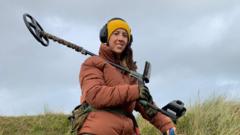How Many Treasure Finds Were Unearthed Near You in England's Record Year?

Published: 2025-11-13 03:00:13 | Category: technology
The number of treasure finds in England has reached an unprecedented high, with 1,446 discoveries reported in 2024, marking a significant increase from the previous year's 1,266. Among the more unusual items uncovered are a lamp shaped like a human foot and an earwax scoop, highlighting the diverse range of artefacts being found. This surge in treasure hunting activity is attributed to a growing community of metal detectorists and new definitions of what constitutes treasure.
Last updated: 18 October 2023 (BST)
What’s happening now
The latest figures from the British Museum's Portable Antiquities Scheme indicate a record year for treasure finds in England, with eastern England proving to be the most fruitful region. The new classification of treasure, which now includes artefacts at least 200 years old and of significant historical importance, has expanded the scope of discoveries, encouraging more metal detectorists to contribute to uncovering and recording the nation's history.
Key takeaways
- 1,446 treasure finds reported in England for 2024, up from 1,266 in 2023.
- New definitions of treasure now include artefacts over 200 years old and of outstanding significance.
- Eastern England, particularly Norfolk, leads with the most finds, highlighting its archaeological richness.
- Metal detectorists are increasingly recognised for their contributions to historical knowledge.
- Sentimental objects, such as wedding rings, are also considered valuable finds, not just precious metals.
Timeline: how we got here
Over the past few years, the landscape of treasure hunting in the UK has evolved significantly:
- July 2023: New definitions for treasure broaden the criteria for what can be classified as treasure.
- 2023: 1,358 treasure finds were initially reported, later adjusted to 1,343.
- 2024: Record high of 1,446 finds reported, with eastern England leading the way.
What’s new vs what’s known
New today/this week
The provisional figures for 2024 include a variety of artefacts, notably a 9th Century penny, which is the first find under the new definition of treasure. The lamp shaped like a human foot and the earwax scoop are also significant, showcasing the range of items that can be classified as treasure.
What was already established
Previously, treasure was limited to items at least 300 years old and made of precious metals or part of a hoard. The change in definition reflects a growing appreciation for historically significant items regardless of their material composition.
Impact for the UK
Consumers and households
For the general public, the rising number of treasure finds can enhance local heritage tourism, potentially boosting the economy as more people visit areas known for their archaeological finds. The excitement surrounding such discoveries can foster a greater appreciation for local history and heritage.
Businesses and jobs
The increase in treasure hunting activities can create opportunities for local businesses, including metal detecting equipment suppliers, museums, and tourism operators. Moreover, it encourages collaboration between archaeologists and detectorists, enhancing the skills and knowledge within the local workforce.
Policy and regulation
With the new treasure definition, there may be calls for greater regulation and discussion among landowners, archaeologists, and the public about the importance of protecting archaeological sites. As more finds are reported, it could lead to a reevaluation of policies regarding land use and archaeological preservation.
Numbers that matter
- 1,446: Total treasure finds in England for 2024.
- 388: Finds reported in eastern England, the highest of any region.
- 85: Treasure finds in Wales, reflecting a growing interest in treasure hunting.
- 9: Reports from Northern Ireland, highlighting regional differences in treasure hunting regulations.
- 1,343: Adjusted total of treasure finds for 2023, showing a consistent upward trend.
Definitions and jargon buster
- Portable Antiquities Scheme: A British Museum initiative that records archaeological finds made by the public.
- Hoard: A collection of valuable items, typically buried together.
- Metal detectorist: An individual who uses a metal detector to find buried metals and artefacts.
- Treasure trove: A legal term for valuable items found hidden or buried, subject to specific laws.
How to think about the next steps
Near term (0–4 weeks)
Individuals interested in treasure hunting should consider seeking out local detectorist groups or clubs to learn more about the hobby and the legalities involved in reporting finds. Engaging with experienced detectorists can provide valuable insights into the best practices for searching and recording items.
Medium term (1–6 months)
As the community of detectorists continues to grow, potential new regulations may emerge that affect how treasure hunting is conducted. Staying informed about changes in legislation will be crucial for anyone involved in the hobby.
Signals to watch
- Changes in local laws regarding treasure hunting and archaeological protection.
- Increased collaboration between archaeologists and detectorists, potentially leading to new discoveries.
- Community interest in local history and heritage initiatives.
Practical guidance
Do
- Join local metal detecting clubs to network with other enthusiasts.
- Always seek permission from landowners before searching on private land.
- Record all finds accurately to contribute to historical knowledge.
Don’t
- Do not ignore local laws regarding treasure hunting and reporting finds.
- Avoid searching in protected archaeological sites without proper guidance.
- Refrain from assuming all finds are valuable; many may have sentimental rather than monetary worth.
Checklist
- Have you researched local laws regarding treasure hunting?
- Do you have the necessary permissions for your search areas?
- Have you joined a community or club for support and information?
- Are you prepared to record and report your finds accurately?
- Have you considered the potential historical significance of your finds?
Risks, caveats, and uncertainties
While treasure hunting can be an exciting and rewarding hobby, it is essential to be aware of potential legal implications and ethical considerations. The definition of treasure can vary significantly based on location, and detectorists must remain informed about local regulations. Additionally, there is the risk of damaging archaeological sites if searches are conducted irresponsibly, leading to irreplaceable loss of historical context.
Bottom line
The record number of treasure finds in England indicates a vibrant and growing community of metal detectorists who are contributing to our understanding of history. As the criteria for what constitutes treasure expands, it becomes even more vital for individuals to engage responsibly with the past, ensuring that all finds are reported and recorded for future generations.
FAQs
What constitutes a treasure find in England?
A treasure find in England is defined as an object at least 200 years old that is of outstanding historical or archaeological significance, irrespective of the material it is made from.
How are treasure finds recorded?
Treasure finds are recorded by the British Museum's Portable Antiquities Scheme, which collects information from metal detectorists and the public to enhance historical knowledge.
Can anyone search for treasure in the UK?
Yes, but individuals must seek permission from landowners and adhere to local laws regarding treasure hunting and archaeological protection.


